Humanities/Arts Exam > Humanities/Arts Notes > Psychology Class 11 > Revision Notes: Human Development
Revision Notes: Human Development | Psychology Class 11 - Humanities/Arts PDF Download
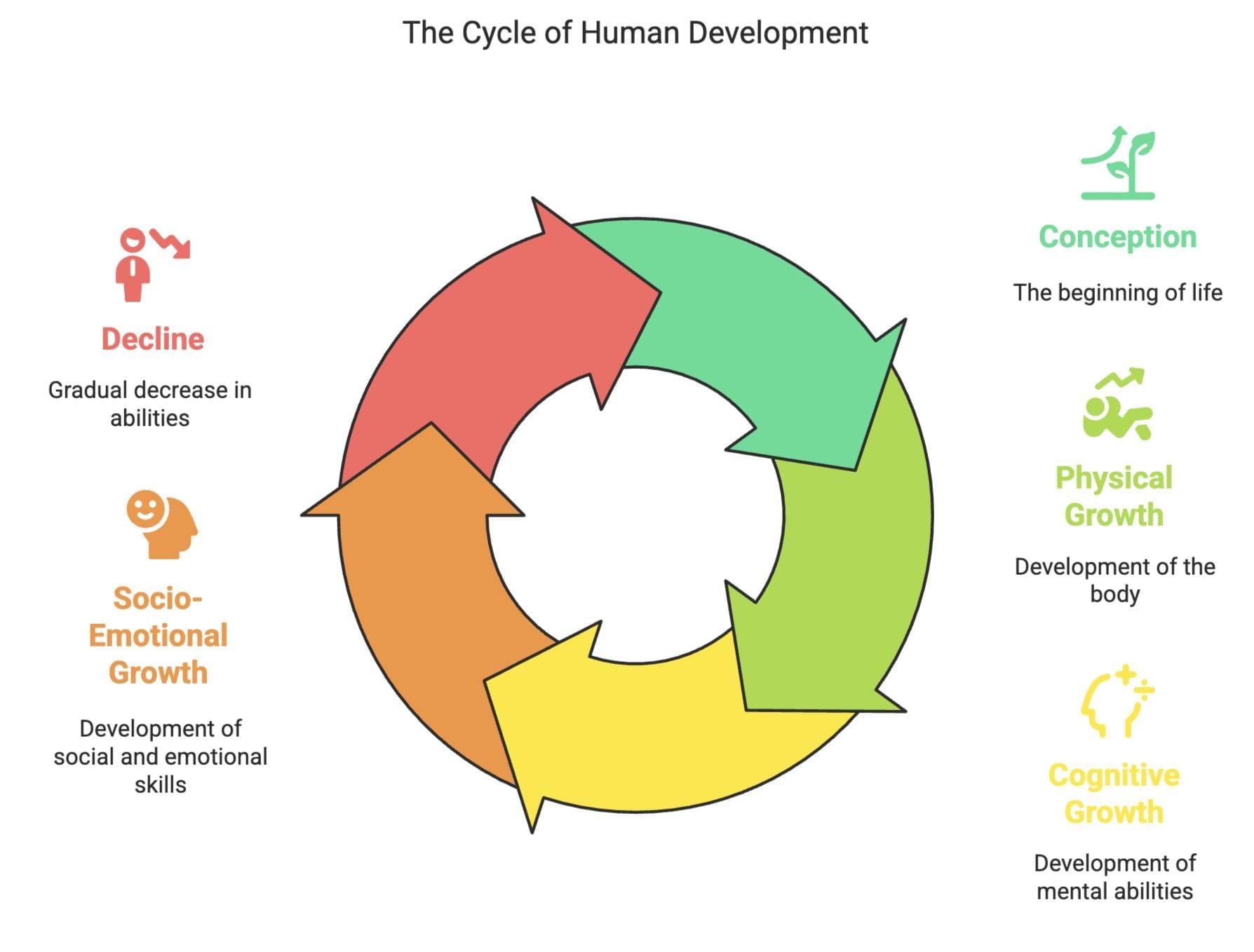
Meaning of Development
- Definition: Series of progressive changes from conception to death, including growth (e.g., height) and decline (e.g., in old age).
- Holistic Nature: Affects physical, mental, and social aspects integrally.
- Key Processes:
- Biological: Genetic influences on physical attributes (e.g., brain, heart development).
- Cognitive: Mental activities like thinking, perception, and problem-solving.
- Socio-emotional: Changes in interactions, emotions, and personality (e.g., child’s attachment to parents).
Life-Span Perspective on Development
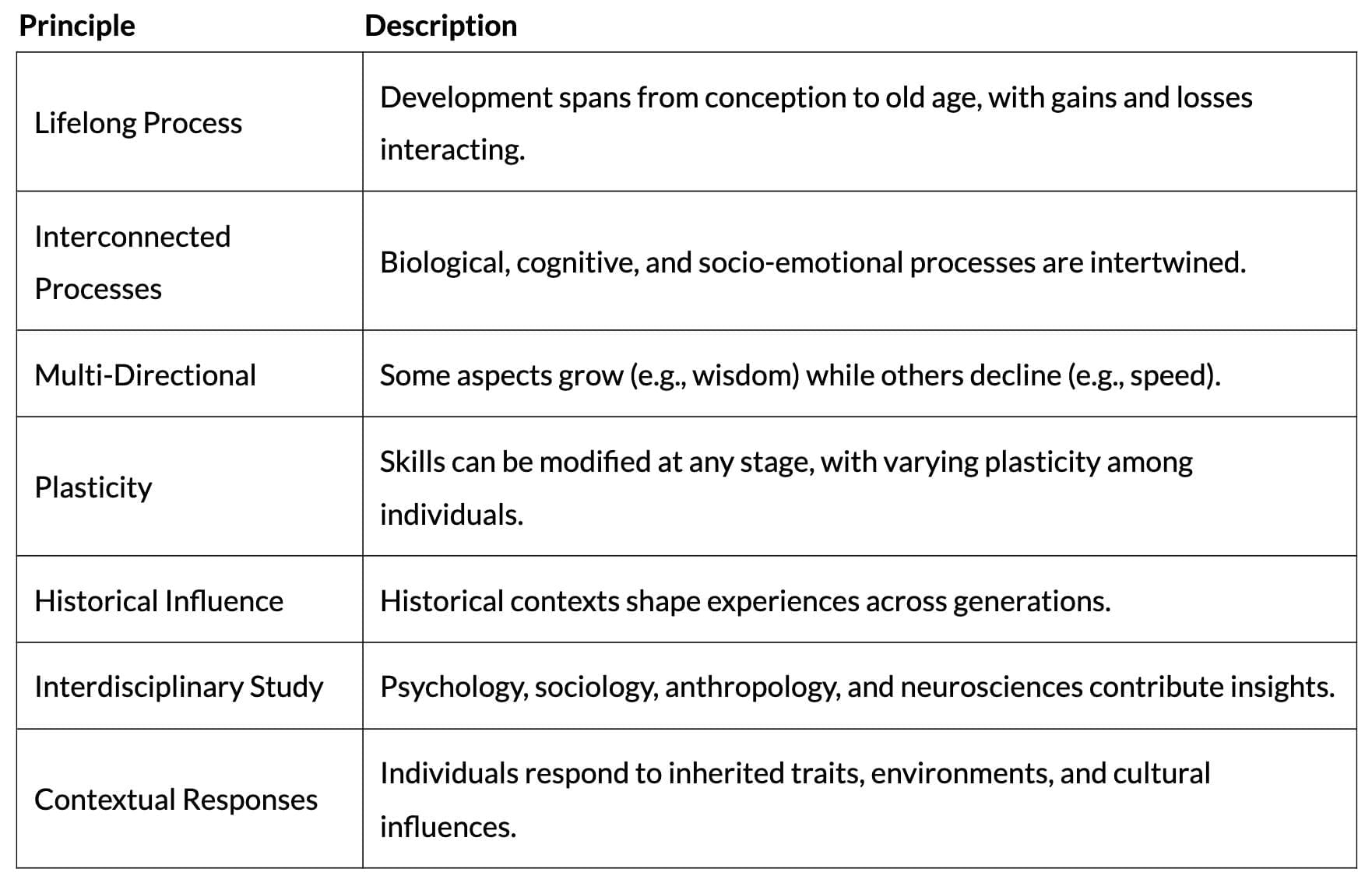
Growth, Development, Maturation, and Evolution
- Growth: Physical increases (e.g., height, weight).
- Development: Holistic changes across physical, cognitive, and socio-emotional domains.
- Maturation: Genetically driven biological changes (e.g., puberty).
- Evolution: Species-level changes over generations, not individual development.
Factors Influencing Development
Heredity and Environment
- Genotype: Genetic code inherited from parents, present in every cell.
- Phenotype: Observable traits resulting from genotype and environmental interaction.
- Environmental Influence: Parents’ genetic predispositions shape environments; children choose environments matching traits.
- Socio-Cultural Context: Development occurs within specific social and cultural settings, evolving throughout life.
Genes vs. Environment
Both influence outcomes like academic success or job attainment, with complex interactions (e.g., a bright child’s success depends on both talent and opportunities).
Context of Development
Bronfenbrenner’s Ecological Systems Theory
- Microsystem: Immediate settings (e.g., family, school, peers).
- Mesosystem: Relationships between microsystems (e.g., parent-teacher interactions).
- Exosystem: Indirect social influences (e.g., parents’ workplace policies).
- Macrosystem: Broader cultural and societal norms.
- Chronosystem: Life events and historical contexts (e.g., divorce, economic crises).
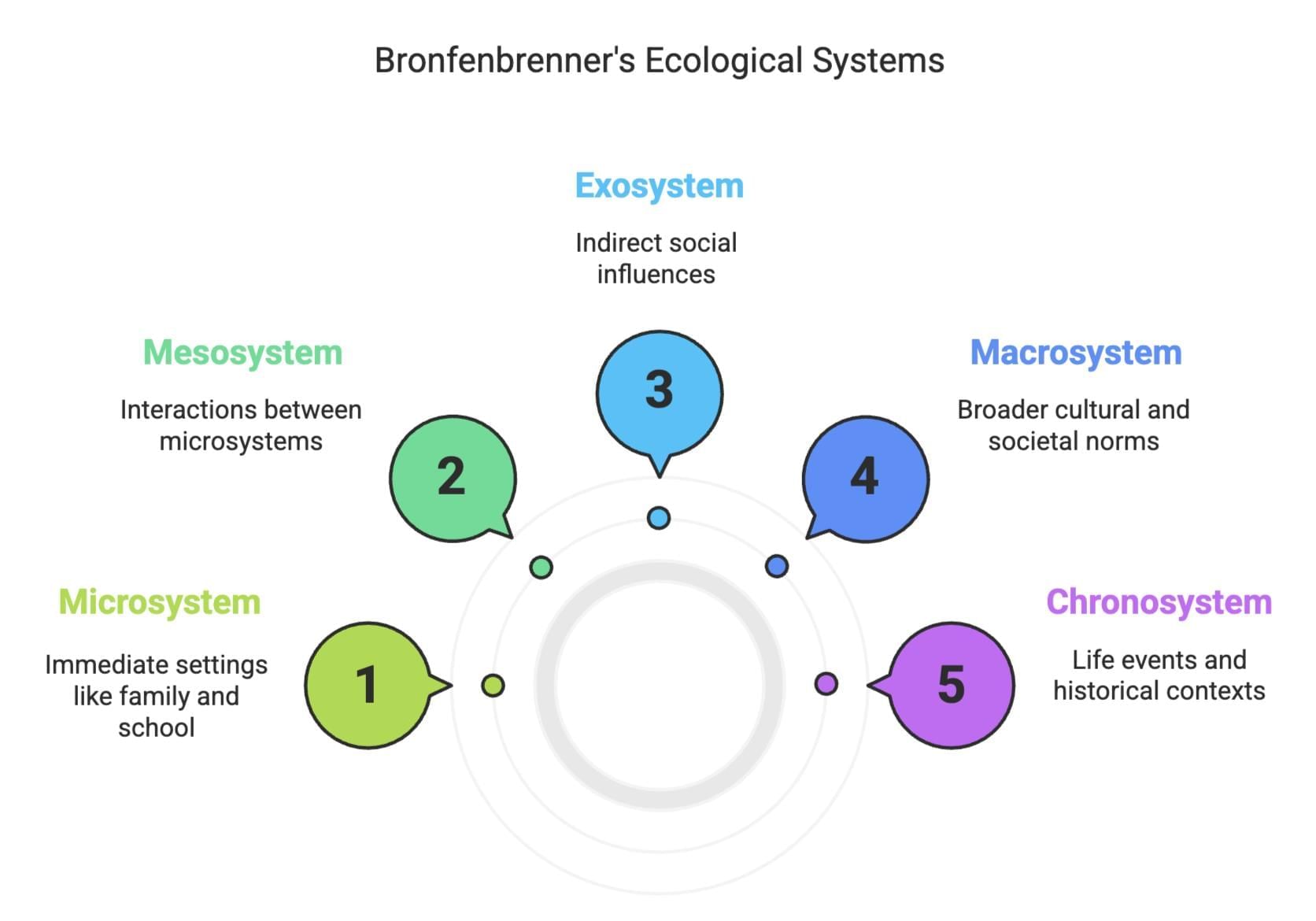
Durganand Sinha’s Ecological Model (India)
- Key Layers: Home, school, peers.
- Factors: Home conditions (space, toys), quality of schooling, peer interactions.
Poor environments (e.g., lack of books, noisy homes) hinder development, causing learning difficulties.
Overview of Developmental Stages
Development is divided into stages with unique characteristics and developmental tasks, varying by individual pace.

Prenatal Stage
- Duration: Conception to birth (~40 weeks).
- Influences: Maternal age, nutrition, emotions; diseases (e.g., rubella); teratogens (e.g., alcohol, pollutants).
- Risks: Abnormalities or death from environmental exposures.
Infancy
Physical Development
- Rapid brain growth; neural connections form.
- Reflexes (e.g., sucking, blinking) transition to voluntary skills (e.g., crawling, walking).
- Cephalocaudal and proximodistal development patterns.
Sensory Abilities
- Recognise mother’s voice; vision improves to near-adult levels by age 1.
- Can feel touch, pain, smell, and taste.
Cognitive Development (Piaget’s Sensorimotor Stage)
- Explores via senses; lacks object permanence initially.
- Vocalisation begins at 3–6 months.
Socio-Emotional Development
- Attachment to caregivers is critical (Erikson’s trust vs. mistrust).
- Contact comfort (e.g., Harlow’s studies) provides security.
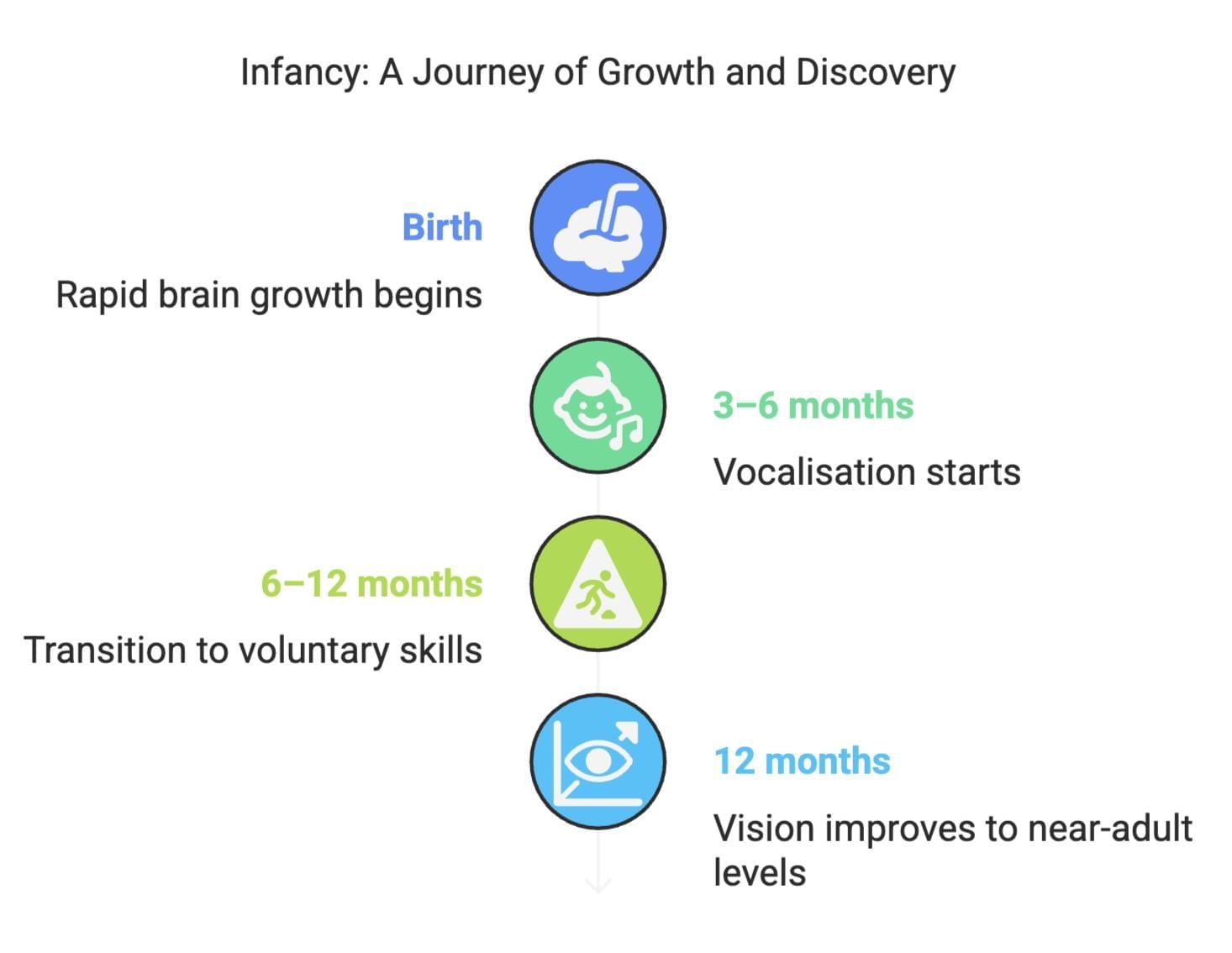
Childhood
Physical Development
- Slower growth; cephalocaudal/proximodistal patterns continue.
- Improved gross (e.g., running) and fine motor skills (e.g., writing).
Cognitive Development (Piaget’s Stages)
- Preoperational (2–7 years): Symbolic thought, egocentrism, animism, centration.
- Concrete Operational (7–11 years): Logical thinking, reversible operations, reduced egocentrism.
Socio-Emotional Development
- Independence and initiative (Erikson’s initiative vs. guilt).
- Self-understanding evolves from physical to psychological traits.
Moral Development (Kohlberg)
- Young children view morality via external authority; progress with cognitive growth.
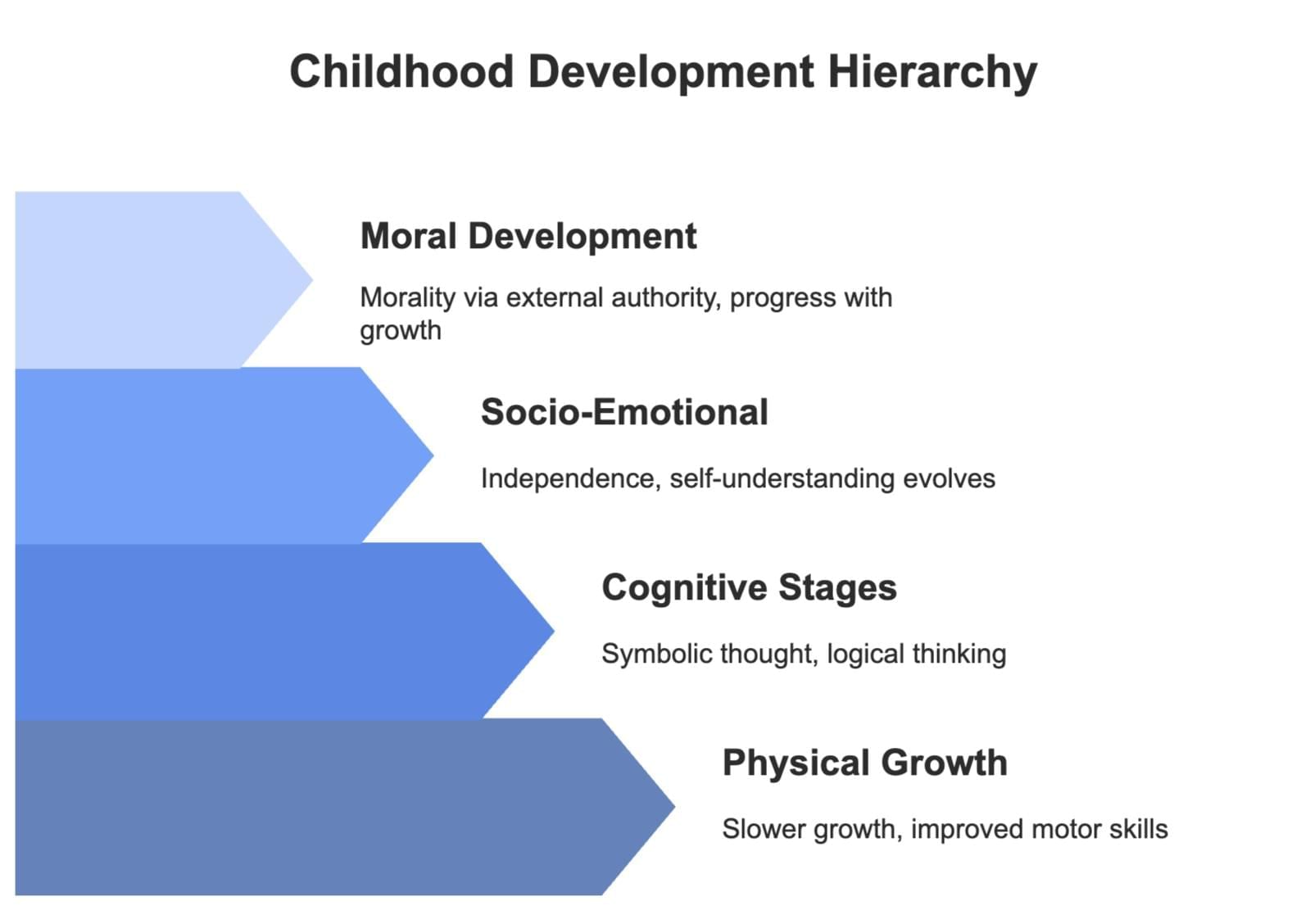
Adolescence
Physical Development
- Puberty: Hormonal changes trigger primary/secondary sexual characteristics.
- Growth spurts (boys: ~12–13, girls: ~10–11); sexual identity forms.
Cognitive Development (Piaget’s Formal Operational Stage)
- Abstract, logical thinking; systematic problem-solving.
- Egocentrism: Imaginary audience, personal fable.
Identity Formation
- Quest for self-identity; conflicts with parents/peers.
- Influenced by culture, family, and socio-economic factors.
Major Concerns
- Delinquency: Behaviours like theft, vandalism, linked to low self-esteem, family issues.
- Substance Abuse: Smoking, alcohol, drugs; driven by stress, peer pressure.
- Eating Disorders: Anorexia, bulimia; influenced by media, urban settings.
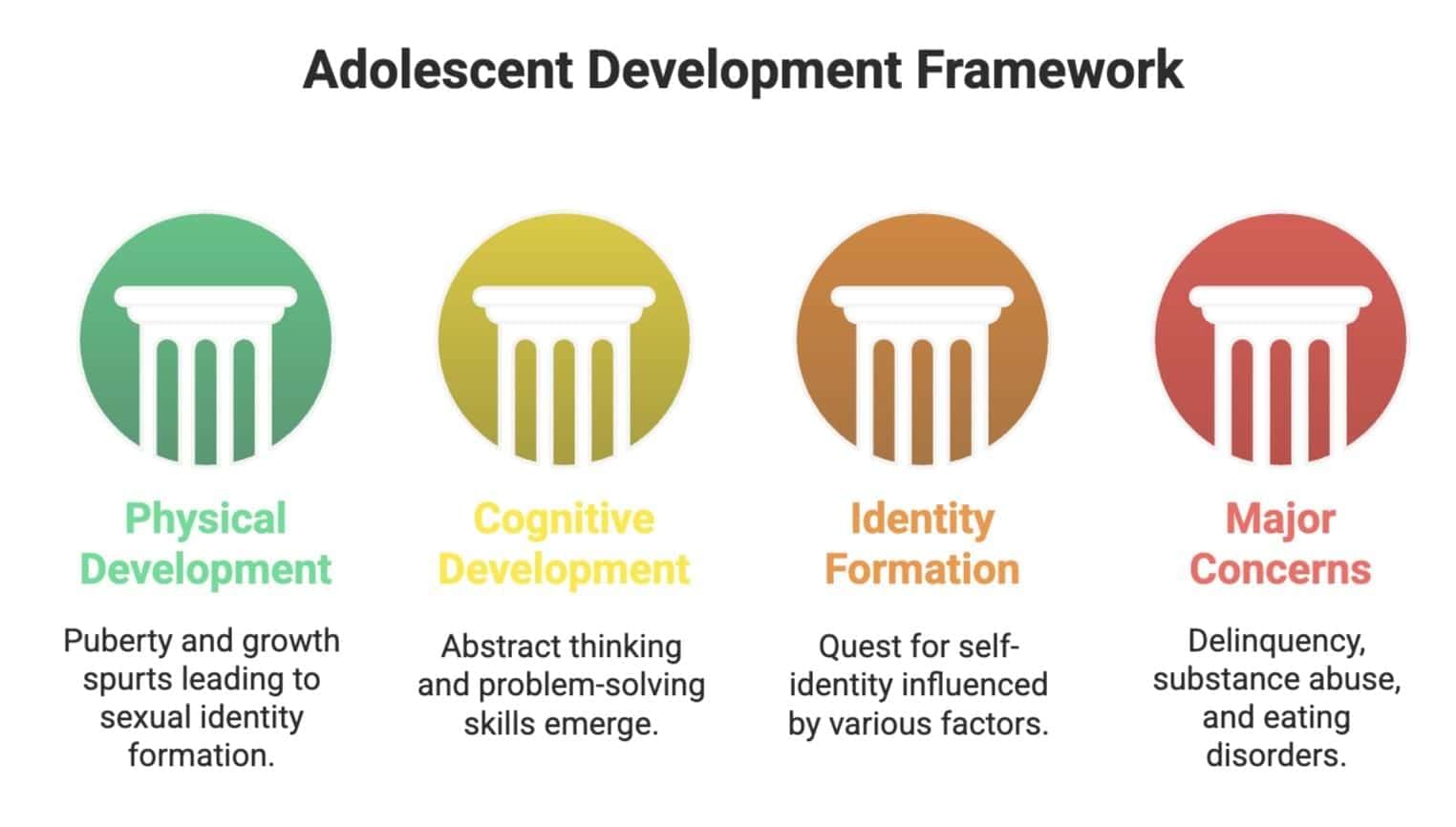
Adulthood and Old Age
Early Adulthood
- Career: Workforce entry, proving competence.
- Family: Marriage, parenting, balancing roles.
Middle Age
- Physical declines (e.g., vision, hearing); cognitive gains in wisdom.
Old Age
- Retirement, health challenges, loneliness; successful ageing via relationships, health.
- Cultural perspectives shape views on death; support systems aid bereavement.
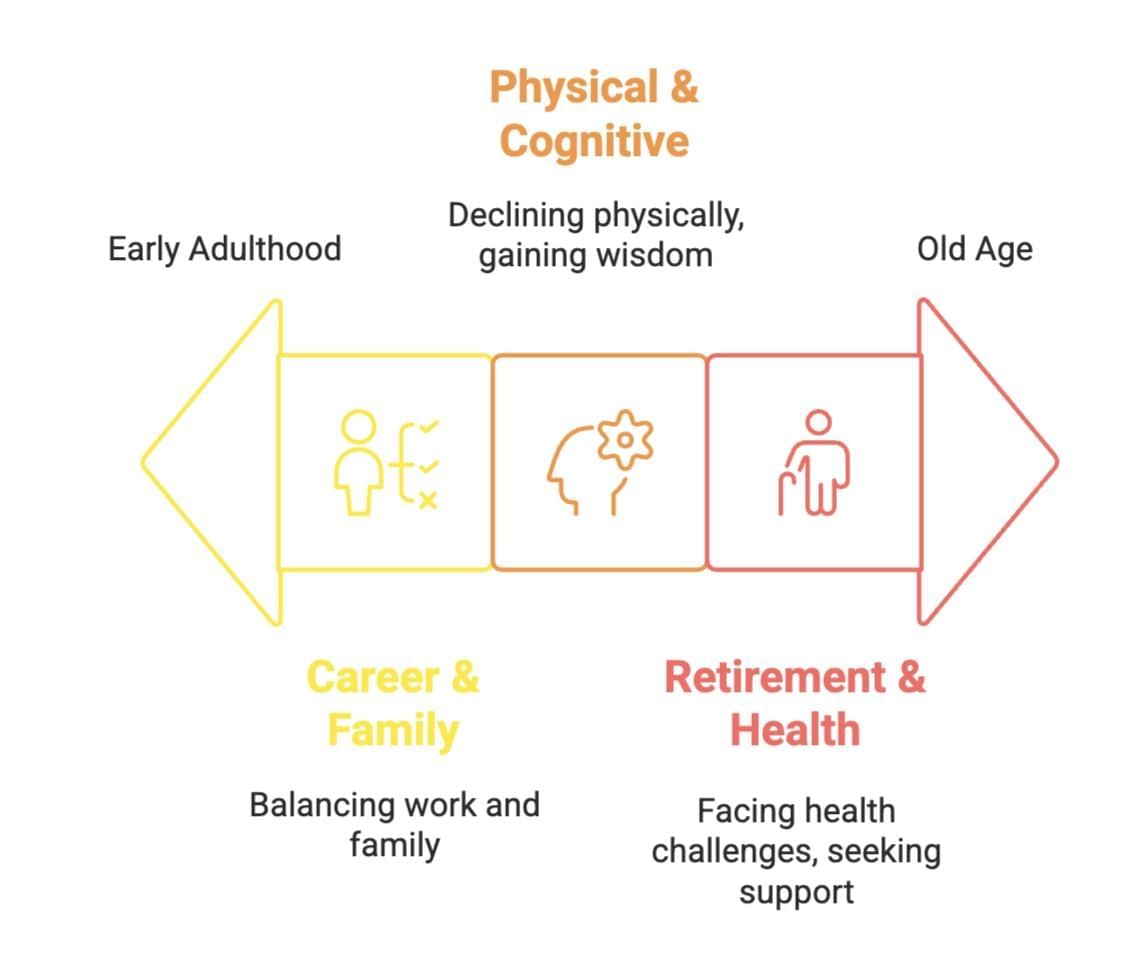
Conclusion
Human development is a lifelong, holistic process influenced by biological, cognitive, and socio-emotional factors within specific socio-cultural contexts. From prenatal stages to old age, each phase presents unique tasks and challenges, shaped by the interplay of genetics and environment, as explained by theories like Bronfenbrenner’s and Piaget’s.
The document Revision Notes: Human Development | Psychology Class 11 - Humanities/Arts is a part of the Humanities/Arts Course Psychology Class 11.
All you need of Humanities/Arts at this link: Humanities/Arts
|
43 videos|88 docs|18 tests
|
FAQs on Revision Notes: Human Development - Psychology Class 11 - Humanities/Arts
| 1. What is the meaning of development in the context of human growth? |  |
Ans.Development refers to the process of change and growth that occurs throughout an individual's life. It encompasses physical, cognitive, emotional, and social changes that happen from conception through old age. Development is not merely about growth in size but also includes the acquisition of skills and abilities that enhance an individual's functioning in society.
| 2. How does the life-span perspective view development? |  |
Ans.The life-span perspective on development emphasizes that development is a lifelong process that occurs from birth to death. It recognizes that individuals grow and change in various ways, influenced by biological, psychological, and social factors. This perspective highlights the importance of examining development across different stages of life, acknowledging that experiences and contexts shape an individual's trajectory.
| 3. What are the key differences between growth, development, maturation, and evolution? |  |
Ans.Growth refers to the physical increase in size and mass, while development encompasses the overall changes that occur over time, including cognitive and emotional aspects. Maturation refers to the natural progression of development that is largely governed by genetic factors, leading to the emergence of certain abilities at specific ages. Evolution, on the other hand, refers to the changes in populations over generations due to genetic variations and environmental pressures, rather than individual growth and development.
| 4. What factors influence human development? |  |
Ans.Human development is influenced by a variety of factors, including biological (genetics, health), environmental (socioeconomic status, culture), and experiential (education, relationships) elements. These factors interact in complex ways, shaping an individual's growth and development throughout their life course.
| 5. What are the main stages of human development, and what characterizes each stage? |  |
Ans.The main stages of human development include the prenatal stage (conception to birth), infancy (birth to 2 years), childhood (2 to 12 years), and adolescence (12 to 18 years). Each stage is characterized by distinct milestones: the prenatal stage involves rapid physical development; infancy focuses on attachment and motor skills; childhood is marked by cognitive and social development; and adolescence features identity formation and increased independence.
Related Searches
















